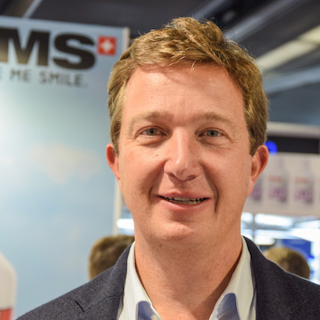How prophylaxis could work in France
When Dr Mathieu Deudon started practising as a dentist 20 years ago, prophylaxis was only just starting to be offered in France. Before that, cleaning teeth in the practice was rather uncommon and remained the responsibility of the dentist. For all of his professional life, he has tried to find new ideas for his patients, and now cleaning the patient’s teeth has become the first step in every treatment and appointment. Dental Tribune spoke with the French implantologist at the ADF (Association Dentaire Française) meeting in Paris in France this year.
Dr Deudon, we are here at the EMS booth and you have been quite a fan of the AIRFLOW. What made you buy the AIRFLOW Prophylaxis Master?
I have always had EMS devices and have been very satisfied with them. I bought the AIRFLOW Prophylaxis Master to provide fast treatment for every patient. The old device was already fast, but this is even faster. The new AIRFLOW PLUS powder has also helped because now the patient requests the powder each time, as well as the device. For two years, the whole office, including the dentist, has been working with air polishing every day. The AIRFLOW is perfect for the first treatment of the patient and for motivating him or her to return to the practice for recall.
Do you disclose before the prophylaxis treatment?
Well, although I really love the new Guided Biofilm Therapy, in France, we have no dental hygienists, so we cannot follow all eight steps. Disclosing is definitely very important to motivate the patient. Disclosing makes perfect sense, especially thanks to EMS’s partnership with Philips. Through disclosing, one can easily explain to the patient in the practice what to do at home. I use disclosing at the first appointment and after the recall. After disclosing, we focus on AIRFLOW, PIEZON, and motivation of and communication with the patient. Disclosing is also very helpful at the end of the appointment so that we can show the patient and check what we are doing. Sometimes, one may forget some areas, so disclosing definitely helps.
Which powder do you recommend, PLUS, SOFT, PERIO, etc.?
It certainly depends on the patient, whether he or she is a heavy smoker, coming back for a recall. We try to find a good frequency for each patient. The dentist needs to find the best frequency, reasons and instruments for recall. If the patient comes to the practice often, we only use PLUS powder. This gives our patient the most comfort. The SOFT powder is stronger, whereas PLUS is easier. In the end, the advantage of the whole system lies in the quality of the powders.
Do you have many patients with calculus?
Of course! I live in the mountains, so sometimes I think that a grizzly is sitting on my chair. We have many patients with calculus. I used to have calculus too. The problem in my office is that, after five or six years, we have found it difficult to keep the patient coming back to the office to control what we have achieved. It is easier to get the patient, but keeping him or her after seven or eight years remains the hardest part. Every time, we need to restart, remotivate and use new technologies to please the patient.
In France, we are allowed to do a treatment twice a year. However, we first consider what the patient wants and needs. Some patients only need cleaning once a year; others have to come monthly. For implants, we are talking about an intensive period of six to nine months. Sometimes, we try to achieve an annual subscription allowing the patient to come as often as possible, just like a sports club. For a subscription period of two years, we see that patients come every month, then every three to four months and finally up to a year.
What frequency of visits would you personally recommend?
The frequency is one issue; the actual treatment is another. What we need is faster and painless treatment. That is why I rely on AIRFLOW powder for every recall. It is more comfortable for the patient, less aggressive to teeth and gingivae, goes quicker and is simply cost-efficient. Another option is also possible: I can offer my patients a private one-year package with basic treatments, including prophylaxis, small fillings, etc. This offers a win-win situation for the patient and dentist.
You have also specialised in implantology and have attended a great number of implant congresses. What do you pay attention to when placing implants?
In any case, patients need to be sure to first go for prophylaxis before implantation. This supports the treatment and recall. We use air polishing and subgingival irrigation before and after every surgery. Sometimes, unfortunately, it is easier to remove an implant than to try everything to preserve it. The greatest focus always has to be on the patient. Removing and placing an implant might take 30 minutes. However, what is more important: the patient’s teeth or new implants?
Why is prophylaxis so important to you?
Prophylaxis means smile protection. The dentist needs to integrate prophylaxis into his or her practice as a routine process. At the beginning and end of every appointment, prophylaxis is important if one really wants to support the treatment outcome. I think that, if one only does prophylaxis for 6 hours and with 12 treatments per day, one could easily make €100,000 per year. In the future, prophylaxis will be fundamental for the health care of patients. I hope that dental hygienists will become very important in French practices. The new generation is already embracing prophylaxis. Hopefully, in the future, all French dentists will implement prophylaxis.
Thank you very much for the interview.
By Marc Chalupsky (DTI)
January 18, 2018
Dr. Matthieu Deudon
5 chemin Promenade 74920 Combloux
dentistes.combloux@mac.com

